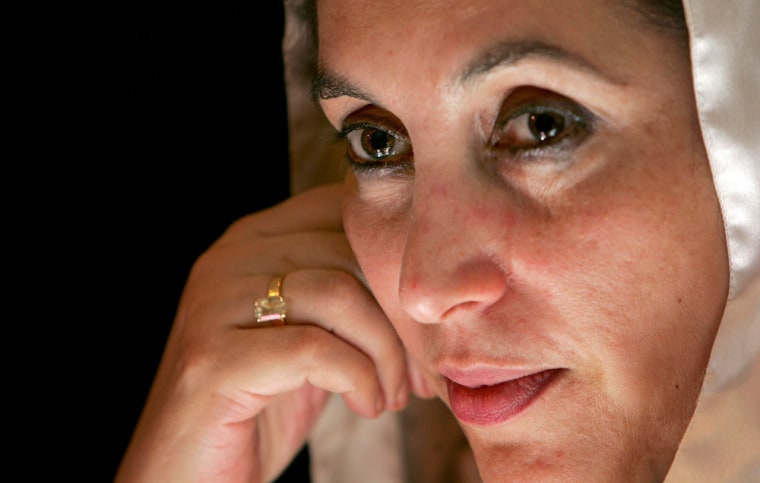Former premier Benazir Bhutto has detailed for the first time a plan to keep Pakistan’s U.S.-allied president in office under a power-sharing deal she said would strengthen the fight against terrorism.
President Gen. Pervez Musharraf is seeking a new five-year presidential term but faces mounting pressure to step down as army chief and restore democracy, eight years after he seized power in a coup.
In remarks broadcast Tuesday, Bhutto outlined an agreement that would reduce Musharraf’s power while allowing her to return from exile — and perhaps to government.
“So we’re not trying to bail out a military dictator by saying we will come there on your terms. What we are seeking is a compromise that could help bring about a stable, democratic, civilian order,” Bhutto said on PBS’ “NewsHour With Jim Lehrer.”
“What we’re negotiating for are certain changes that will empower the Parliament to take on the militants,” she said.
A deal with Bhutto offers Musharraf a chance to fend off challenges to his continued rule and make good on pledges to combat the Taliban and al-Qaida, viewed with growing skepticism in Washington and other NATO capitals with troops in neighboring Afghanistan.
However, he has given no clear indication that he will make concessions demanded by Bhutto, including quitting the powerful post of army chief.
Musharraf’s spokesman was not immediately available for comment Wednesday.
Exiled ex-leaders vow imminent return
Bhutto said Musharraf had to lift a ban on twice-elected prime ministers — such as herself and another exiled former leader, Nawaz Sharif — from serving again.
Graft charges against herself and other ex-officials must be dropped, she said. Both Bhutto and Sharif have vowed to return to Pakistan this year, further raising the political temperature.
Sharif has asked the Supreme Court to ensure he is not arrested or deported on arrival.
Government lawyers on Wednesday gave the court a copy of what they said was the pledge signed in 2003 by Sharif that he would leave Pakistan for 10 years. In return, the government released him from a jail sentence and let him leave for Saudi Arabia.
The government denied Sharif had been forced into exile and said he would be “dealt with in accordance with law” if he came back.
Sharif acknowledged the “understanding” with Saudi Arabia, but denied any agreement with Musharraf. “I think all their talk is absolutely fraud and drama,” he told Geo TV in a telephone interview from Germany.
Bhutto said Musharraf must also explain how organizers will prevent parliamentary elections to be held by January from being “stolen in the field” and give back to Parliament some of the sweeping powers he took after ousting Sharif in 1999.
Endorsement hinges on uniform
Asked what she was offering in return, Bhutto sketched a path through the legal labyrinth that other opposition parties insist preclude Musharraf’s staying in power.
“There are going to be two presidential elections. The first presidential election is going to take place in September, when General Musharraf is still wearing the (military) uniform,” Bhutto said.
While her Pakistan People’s Party could not vote for him while he remains army chief, she suggested it would endorse him later if he gives up that post.
“If the (parliamentary) elections are fair, and we have a level playing field, and he seeks re-election from the next assembly, then certainly the Parliament can consider that, if the uniform is not there,” she said.
Bhutto blamed the military-led government for spreading extremism in Pakistan, but avoided direct criticism of Musharraf.
She accused senior officials of “collusion” with militants and said Parliament needed the power to act “without being destabilized by elements of the security apparatus who do not wish to see the terrorists and the extremists contained.”
Quick steps urged
Asked about comments by U.S. officials suggesting American forces could attack al-Qaida targets in Pakistan, Bhutto said she opposed “unauthorized military action that violates Pakistan’s sovereignty.
“But at the same time, I recognize that, unless the government of Pakistan is able to take control of its own territories, Pakistan will face the danger of outside military strikes.”
Bhutto warned Musharraf to take concrete steps toward democratic reform by the end of August to keep a power-sharing deal on track or face a united opposition.
“At the end of the day, we can’t afford to be contaminated by his unpopularity without getting the prize for democracy,” she said.
